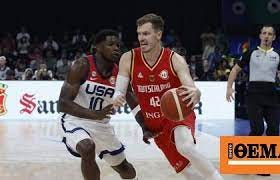It's a small hoop world, but Team USA can't measure up
The loss to Germany in the FIBA World Cup semifinal doesn't bode well for 2024.
The U.S. lost an international basketball competition Friday morning, as you might or might not have heard. Germany’s Sons of Nowitzki toppled Team USA 113-111 in the semifinals of the FIBA World Cup in Manila.
It was the top moment in the history of Die Mannschaft, which now meets Serbia for gold. The Americans play Canada, a team with at least equal talent, in the scramble to avoid explaining why they went all the way across the Pacific Ocean and forgot to get souvenirs.
The Germans were appropriately excited. Andreas Obst, who plays for Bayern Munich, had 24 points, including a nerveless 3-pointer in the final half-minute. Soon, Obst’s face was featured on the Internet as a Fulton County, Ga. mug shot, and he was hailed as the Obst-stacle. Others discovered that “Obst” means “fruit” in German, and this player certainly wasn’t low-hanging. At 27 he has plenty of time to capitalize on his spotlight dance, if the NBA holds much appeal.
The Serbians were also emotional about beating Canada. Two-time NBA MVP and current NBA Finals MVP Nikola Jokic isn’t playing. Neither is Borisa Simanic, who was elbowed in a win over South Sudan, needed to have a kidney removed, and is still in a Manila hospital.
“It doesn’t matter who’s not here,” said Marko Guduric of Serbia. “It’s in our blood. We do not give up.”
Some of us can remember when a U.S. basketball loss was almost as humiliating as watching Sputnik orbit the earth before we could assemble Project Mercury. In 1988, American collegians were beaten by the Russians in Seoul and the nation was aghast. In 1990, another group of American collegians faced Yugoslavia in the Goodwill Games in Seattle, and Toni Kukoc conducted a tutorial on how to move the ball inside and then out to find the 3-point shooters. That loss, and the way it happened, fascinated U.S. coach Mike Krzyzewski, and his Duke teams became pioneers in Stretchball, in which you forced your opponent to guard the whole half-court. Golden State parlayed this into four NBA championships. But sometimes your traditional low-post center had to disappear into the vortex.
Three U.S. Olympic gold medals,featuring the best pros, followed all that, and then three more after Argentina sidelined the U.S. in 2004. But by then, international players had begun their slow takeover of the NBA, and it was more difficult, and less important, to equate Olympic basketball outcomes with national hoop superiority.
This FIBA team had few A-listers. LeBron James, Steph Curry, Anthony Davis, Jayson Tatum, Bam Adebayo and Jimmy Butler all passed or weren’t asked. A talented group replaced them, led by the startling Anthony Edwards. There were no traditional centers, at least none who deserved to start, but the U.S. still was the tournament leader in blocked shots.
It wasn’t like the Americans left a lot of fanatical rebounders at home. That player, the guy like Kenneth Faried or the young Paul Millsap or Dennis Rodman, has been phased out of the game by the necessity of shooters at every position. Of the 10 leading rebounders in the NBA this past season, only the 10th was an American, and that was the Knicks’ Julius Randle, who wasn’t in Manila.
Still, Team USA wasn’t physical enough to deny Germany’s Daniel Theis, the old Celtic dockworker, a 21-point night in the semis.
Maybe the Yanks were just tired. All of them played all seven games except for Brandon Ingram, who missed the loss to Germany. When the season starts, how can we ask these players to actually wear warmups to every game? There’s an art to obsolescence, and we need our guys to look sharp, if not be sharp.
The NBA is concerned about the abuse of load management. Well, kind of. It will require players to play in at least 65 games to qualify for postseason awards. Players do care about such things. But this still allows them to miss 20 percent of the schedule.
Then there is the NBA Cup, a tournament to begin the season. The league is hoping the top players will be ready and willing to lay it on the line, and has promised half a million per player to the championship team. The other finalist will get $200,000.
The NBA is borrowing this concept from European soccer. If this works, maybe the NBA can also take the English Premier League’s attitude toward playoffs (there are none), a salary cap (there is none), the draft (none), and relegation. If the NBA’s six worst teams were faced with banishment to the G League the following season, with no TV money, maybe their stars would consider a more extensive participation strategy.
In any event, don’t expect to see your favorite star in action during the week AFTER the NBA Cup. What do you think these guys are, machines?
But one can understand it if they’re ambivalent about 2024 in Paris. There are diminishing returns to Olympic competitions. The players no longer need a gold medal to buff up their individual brands. Jake From State Farm will be waiting for each one. And if any of them are caught daydreaming during the Star-Spangled Banner, they’ll be castigated as “woke” traitors instead of getting credit for wearing a national uniform, something the Internet denizens would never do.
These and other issues can be debated during the NBA off-season, which stretches from October through mid-April. As for the FIBA squad, it deserves our thanks and respect. May we never get to the point where a win over Team USA is no longer the highlight reel in the emerging life of a hoop nation.



